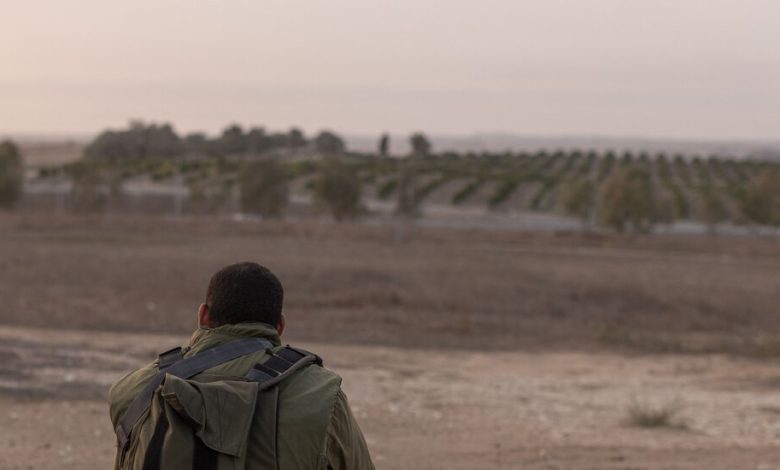There Is No Way to Escape the Moral Challenge of War

As Israeli soldiers mass outside the Gaza Strip, preparing to launch a ground invasion that could lead to extraordinarily intense urban combat, there is a community of people who know what these soldiers are about to face. And that community knows that there is no way through the fight without sorrow, confusion and terrible heartbreak.
American veterans of Iraq and Afghanistan know both the necessity of confronting a force like Hamas, which President Biden called “pure evil,” and the horrifying choices that decision entails. And we know that discussions of law and tactics — as important as they are — provide only partial answers. There is no way to escape the moral challenge of war.
As a former JAG (or Judge Advocate General’s Corps) officer embedded with a combat arms unit in Iraq during Operation Iraqi Freedom, I know that you can’t simply merge law and tactics and declare that everything that is legally and tactically sound is also moral, much less wise. We veterans know that the challenge for the Israel Defense Forces in Gaza isn’t simply to win the fight with Hamas within the laws of war. There is a third imperative, one that will define the soldiers who fight and the nation they defend for years to come: Do not destroy your soul.
This is much easier said than done. To shrink from evil because the fight will be hard and complex and fraught with risk to soldiers and civilians alike is to both reward barbarism (it sends the signal that sufficient savagery will be rewarded with impunity) and to forsake the sacred duty of protecting your citizens from harm. To lean into the fight, to stretch your violent reach every bit as far as the law allows, can create both an ocean of anguish and bitterness in civilian populations and leave a “bruise on the soul” of the combatants themselves, altering their lives forever.
To illustrate the depth of the problem and its deadly stakes, I want to share two stories from my own unit’s deployment in Diyala Province, Iraq, in 2008. The first occurred on the night of Feb. 10. A roadside bomb had claimed the life of a young sergeant, Corey Spates. He died a week after his first wedding anniversary. Other soldiers were wounded by the blast, and medical evacuation helicopters were coming to collect the wounded.
I was at our headquarters monitoring the unfolding situation through video feeds from nearby aircraft, and that’s when we spotted a small group of what appeared to be young men hiding in an irrigation ditch, directly in the path of the incoming helicopters. We didn’t see weapons, but our video feed was grainy and blurry. Their prone posture matched enemy tactics. We knew Al Qaeda in Iraq insurgents often infiltrated our area of operations by crawling through irrigation ditches, and these men were perfectly positioned to make a terrible night even worse, by shooting down the low-flying helicopters that were minutes away.
What do you do? Under the general principles of the laws of war, we had the ability to make sure the helicopters could land safely by opening fire on those shadowy figures. They were exhibiting what we called enemy “TTPs” (tactics, techniques and procedures). But just because you can shoot doesn’t mean you should.
My commander chose a middle way. He ordered a detachment of cavalry troopers to quickly move to investigate, opening themselves up to potential ambush. And when our troopers arrived, they found not armed men, but a small band of terrified middle school-age boys who had heard the blast, run outside to see what happened, and now were cowering in fear. I shudder to think of the consequences had we chosen to open fire — both in the pain we would have inflicted on a community we were trying to protect and on the hearts of the men who would have killed children, even if the law would have permitted the attack.
Does this always mean that the lesson is to demonstrate patience and take extraordinary risks? No. On Sept. 24, 2008, our troopers pursued a car that had escaped from a cordon of soldiers who were seeking to isolate and capture a small band of suspected Al Qaeda insurgents. As the car sped away, the question arose: Could our soldiers engage?
The answer again was no. Though there was a strong argument that the laws of war would permit our troopers to attack, caution was again the order of the day. So they pursued the car, cornered it and my friend Mike Medders moved to investigate and detain the occupants. This time there were no boys present, only terrorists. One of them was wearing a suicide vest. He blew himself up, and my friend suffered mortal wounds. He died as his comrades desperately tried to render medical aid.
There are readers who might consider these two stories — along with the countless similar accounts from our decades of combat in the Middle East — and think, this is just too horrible. It is better not to fight than to face choices so terrible. But then there’s the other story of our deployment, of how a large portion of Diyala Province was in the grip of Al Qaeda in Iraq. In 2008, its weapon of choice was the female suicide bomber, and the carnage the suicide bombers inflicted on Iraqi civilians was beyond horrific. It was a moral imperative to defeat them and to give the people of the province the chance to live safe and free.
In Diyala in 2008, we made our own moral choices. We defeated the terrorists, and when in doubt our soldiers risked their own lives to protect civilians. The pride and sorrow of those decisions remain with so many of those who served.
This is the problem Israeli soldiers and commanders face. They must protect their citizens from savagery. They must comply with the laws of war. And they must make a series of moral choices, under extreme duress, that can define them and their nation — all while they face a terrorist enemy that appears to possess no conscience at all.
We see these dilemmas unfold even now. Ordering large numbers of civilians to leave the zone of conflict risks a humanitarian catastrophe. But if they remain in the line of fire, then the options are worse still. There is a reason, for example, why Hamas wants civilians to stay. The challenge of fighting a pitched battle amid the civilian population will both render Israel’s attack more difficult and take more civilian lives. But refusing to attack and leaving Hamas in control of Gaza would create its own moral crisis.
In December of 1776, at a dark moment in the American Revolution, Thomas Paine wrote one of the most famous sentences in the founding of America. “These are the times that try men’s souls.” He was referring to the despair of potentially losing a war. “Tyranny, like hell,” he wrote, “is not easily conquered.”
Israel is about to embark on a military task that will try its soul, against a hell that is not easily conquered. We can and must talk about tactics and law. They provide an indispensable minimal standard of conduct, but the ultimate course of the conflict will depend on the outcome of countless moral choices, and those choices will be the most difficult of all.
The Times is committed to publishing a diversity of letters to the editor. We’d like to hear what you think about this or any of our articles. Here are some tips. And here’s our email: [email protected].
Follow The New York Times Opinion section on Facebook, Twitter (@NYTopinion) and Instagram.




